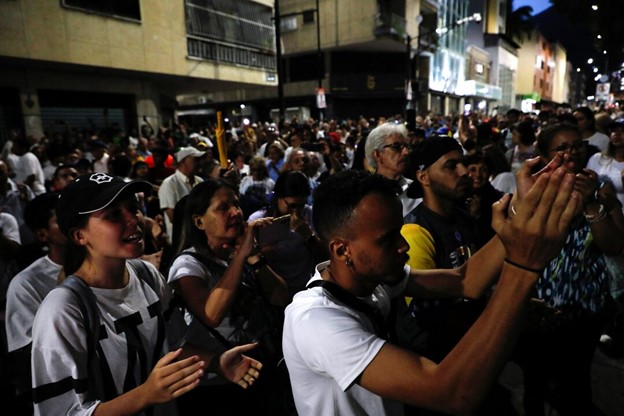CARACAS (Reuters) – Venezuelans were awaiting results late on Sunday in the most consequential election in a quarter-century of socialist party rule, with the opposition saying they believed there were “reasons to celebrate” but asking supporters to continue monitoring vote counts.
Government officials also cheered the vote, with Jorge Rodriguez, a ruling party lawmaker and the head of its campaign, saying on state television: “Love won.”
In the run-up to Sunday’s election, President Nicolas Maduro had expressed confidence that he would secure a third term in office even as it was clear that the opposition had attracted impassioned support.
Opposition leader Maria Corina Machado has been the star of the coalition campaign, despite a ban on her holding public office that forced her to pass the torch to candidate Edmundo Gonzalez, a 74-year-old ex-diplomat known for his calm demeanor.
Gonzalez won backing even from some former supporters of the ruling party, but the opposition and observers raised questions ahead of the vote as to whether it would be fair, saying decisions by electoral authorities and the arrests of opposition staff were meant to create obstacles.
Maduro – whose 2018 reelection is considered fraudulent by the United States, among others – has said Venezuela has the world’s most transparent electoral system and warned last week of a “bloodbath” if he loses.
The timing of an official result announcement remained unclear as of Sunday evening.
The opposition asked voters to remain at polling stations to closely watch the count.
“I want to reiterate to our witnesses at the ballot boxes that they should not leave the voting centers until they have the voting record in hand,” said opposition official Delsa Solorzano. “Having the records in our hands is a legal right.”
“With the percentage of records that we have, there are reasons to celebrate,” she added.
Solorzano was not allowed to enter the electoral authority’s main facility to observe the national count, though two other opposition witnesses were inside, the opposition said.
There were several polling stations where opposition observers were not being allowed to observe the count, she added. Attorney General Tarek Saab told Reuters on Sunday evening that he did not anticipate any violence and that except for some isolated incidents voting had been peaceful.
Less than a block from Saab’s office in central Caracas, dozens of ruling party supporters arrived together on motorcycles outside Andres Bello secondary school, the country’s largest voting center, scuffling with opposition supporters gathered outside.
The crowd dispersed after about 20 minutes, but videos on social media showed similar incidents in other locations around the country.
The Venezuelan Observatory of Social Conflict said on X that armed groups of the motorcycle-riding ruling party supporters known as ‘collectives’ were reported in six states and Caracas.
A legal restriction bars publication of polling from a week before the election until official results are announced, although several exit polls began circulating on social media in the late afternoon.
Estimates released by the opposition said just under 55% of people had voted nationwide.
Reuters journalists in seven locations around the country had reported morning lines outside polling stations, including some that opened late or where voting was moving slowly. Many voters had arrived before dawn.
“I work cleaning houses and my four grandchildren depend on me. I earn just $15 per week and that is enough to eat one day but not the next,” said Luisa Gonzalez, 61, who voted in the state of Bolivar, traditionally a ruling party bastion.
“I was a Chavista, but people have changed,” she said, using the term for ruling party supporters, a reference to the late President Hugo Chavez.
Maduro’s government has presided over an economic collapse, the migration of about a third of the population, and a sharp deterioration in diplomatic relations, crowned by sanctions imposed by the United States, the European Union and others which have crippled an already struggling oil industry.
Maduro said if returned to power he would guarantee peace and economic growth, making Venezuela less dependent on oil income.
Maduro voted early in the morning in Caracas and said the result announced by the electoral authorities would be recognized and defended by the armed forces and the police.
Maduro said he would decree a national dialogue on Monday, using a term that typically means conversations between the government and opposition, businesses, communities and others.
Many Maduro supporters speak enthusiastically of his mentor Chavez, and see Maduro, in power since Chavez’s death in 2013, as a continuation of Chavez’s legacy of helping the poor.
Others told Reuters they saw Maduro’s record as mixed but that they would back him.
“There are things that without doubt need to improve in our country, but this government has lived through sanctions and blockades like no other. That’s why I back President Maduro and think he deserves another chance,” said Jose Lopez, 57, as he waited to vote in central Valencia.
Gonzalez and Machado have promised major changes and said a fresh start may motivate migrants to return. The two opposition leaders have said they expect the military to uphold the results of the vote.
Venezuela’s military has always supported Maduro, a 61-year-old former bus driver and foreign minister, and there have been no public signs that leaders of the armed forces are breaking from the government.
Forty-six people have been arbitrarily detained since Friday in connection with the elections, Gonzalo Himiob, the vice president of human rights organization Foro Penal, said on X late on Sunday, and at least 23 remain detained.
People demand witnesses for vote counting, Caracas, Venezuela, July 28, 2024.

